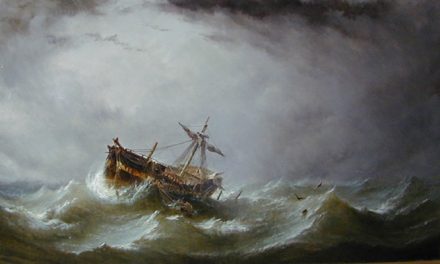 I would like to thank Brad Rothrock for continuing our discussion on faith, politics, and partisanship (Brad’s most recent post is here; his original post is here and my response is here). His most recent post is helpful for making clear that there are deeper theological and philosophical issues at stake in the discussion than I realized at first, and that disagreements over these issues help explain why, while some have been enthusiastic about the editorial policy at America magazine that served to initiate this discussion, others have reacted negatively.
I would like to thank Brad Rothrock for continuing our discussion on faith, politics, and partisanship (Brad’s most recent post is here; his original post is here and my response is here). His most recent post is helpful for making clear that there are deeper theological and philosophical issues at stake in the discussion than I realized at first, and that disagreements over these issues help explain why, while some have been enthusiastic about the editorial policy at America magazine that served to initiate this discussion, others have reacted negatively.
Before getting to the substance of my response, I want to point out a couple of things I find curious about Rothrock’s most recent response. First, despite my rejection of the label, Rothrock continues to describe my views as “post-partisan,” and not only that, the post-partisan mindset has now been elevated to a “movement.” For example, Rothrock writes that “postpartisans worry that partisan identities are, or have already, colonized Catholic identity.” Just to be clear, I do not have a problem with Catholics identifying with one or another political party, and I am also not denying that there are “parties” within the church (or that we must responsibly “take sides” on ecclesial issues); my concern is that partisan identities from electoral politics do not adequately describe ecclesial identities. Also, I am not part of a “post-partisan movement”; my views are simply my own (although the idea of a post-partisan party is so humorous that it probably should exist). Second, Rothrock claims that those he is calling “post-partisans” are “attempting to carve out some space of ecclesial or faith-based neutrality.” Perhaps Rothrock has in mind America editor Matt Malone’s response to a series of difficult questions, “We are Christian.” I admit this response is a bit frustrating, but I believe its purpose is not to claim that being Christian puts us above the fray and provides us with pat answers, but simply to state that our identity as Christians will be the starting point for vigorous debate, rather than some other identity. I myself never made any claims to neutrality on ecclesial or political issues.
So to begin my substantive response, I want to first outline two important points where I assume there is significant agreement between Rothrock and myself.
1. Existentially speaking, we are thrown into a cultural, economic, and political situation not of our choosing that is an integral part of our identity. Theologically speaking, our human vocation must include a response to the situation in which we find ourselves. To understand our human vocation merely in terms of an abstract human nature, in which our social location is merely incidental to our identity (in other words, to think of ourselves as neutral and above the fray), would in fact be a kind of alienation from our real being and, in theological terms, a form of sin.
2. Our cultural, economic, and political situatedness also shapes our knowing. The way we see the world is shaped, and in a sense limited, by our social location. I would not say it is absolutely bound by it; we can expand our horizons through encounters with those different from us, but that is not at all saying that we gain a “bird’s eye view” free from our context, it simply means that our context expands.
I feel confident that Rothrock agrees with these claims because I believe that is what he means by “implicit curriculum,” which he defines as “a background pedagogy that forms people in their consciousness and worldviews.” I also agree that people’s consciousness and worldview are reproduced through practices. Rothrock provides the excellent example of how the recent implementation of the English-language missal not only communicates but reproduces a certain understanding of the role of authority and lay people in the church.
Where I part ways with Rothrock is his description of this process as fundamentally one of “the distribution and deployment of power,” which I know requires some qualification. In what follows I am dependent on D. Stephen Long’s “What Makes Theology ‘Political’? Come Let Us Reason Together” (Political Theology 5 (2004): 393-409; the article is excellent and worth reading in full, but unfortunately requires access to a journal database).
Long argues that many political theologians define the “political” as most fundamentally having to do with power, and not with truth or goodness (a definition of the political that Long claims is derived from the sociologist Max Weber). Therefore to be authentically “political,” theology “requires a ‘power analysis’ of competing interests in specific contexts always under the threat of violence” (399). Theology that does not begin with this starting point is dismissed as “apolitical, sectarian, ideological” because it apparently seeks to avoid contextualization; it refuses to engage in political reasoning and therefore cannot be meaningfully engaged (399). I believe this is what Rothrock means by claiming that I am “attempting to carve out some space of ecclesial or faith-based neutrality”; I am attempting to talk about faith in a way that is not first fundamentally about power.
The problem, according to Long, is that in a sense it is the political theologians who are being “sectarian.” Their definition of what the political entails is itself asserted without being subject to public reasoning, and is therefore shielded from scrutiny. Rothrock demonstrates Long’s point when he asserts that, if we were to discuss the issue of the English-language missal, “you have to have recourse to a language that takes the distribution and deployment of power into account” (emphasis mine). However, it is not clear what justifies this imperative. Elsewhere he writes that “the idea that faith itself, or the ecclesial structures and expressions of faith, or Christianity, is somehow outside of political, social, or economic description is almost laughable”; a way of talking about faith not in terms of power (which is how he defines “political, social, or economic description”) is not to be reasonably engaged because it is by definition irrational, yet Rothrock’s criteria of rationality are thereby removed from discussion.
Long’s point is that the understanding of the political as most fundamentally about power is itself a contextually-dependent way of seeing the world; the political theology he critiques is engaged in a bit of mystification by insisting that this truth claim (and only this truth claim) is objective and obvious. John Milbank makes a similar point in his Theology & Social Theory when he discusses the “nihilism” of Nietzsche and Foucault, whose genealogies expose knowledge as the expression of power: “nihilism, as an ontology, is . . . no more than a mythos” (second edition, 279). What he means is that Nietzschean and Foucauldian genealogies only work if the genealogies themselves are objective and true, but this is precisely what they cannot be under their own terms.
The definition of politics as fundamentally about power is based on the view that reality, or at least human life together, is at its root conflict and violence. Yet this is hardly the worldview of Christianity, which Milbank describes as grounded in an “ontology of peace.” Likewise, Long argues that Christians should define the political as the common pursuit of the true and the good. This “ontology of peace” is also central to Catholic social teaching, for example in the rejection of the Marxist notion of class conflict from Leo XIII’s Rerum Novarum to the Congregation for the Doctrine of the Faith Instructions on liberation theology, and Pope John XXIII’s rejection of political realism in Pacem in Terris.
Rothrock claims that attempting to speak about faith without first starting with power “dehistoricizes, decontexualizes, and therefore spiritualizes it.” That assumes that history is foundationally the story of the struggle for power, yet Christianity has a very different view of history. History begins with an orderly and harmonious creation that God declares “good.” The struggle for power only enters the world as a result of sin. God enters history in the Incarnation not to take part in a struggle for power (“Do you think that I cannot call upon my Father and he will not provide me at this moment with more than twelve legions of angels? But then how would the scriptures be fulfilled which say that it must come to pass in this way?” Matt. 26:53-54), but to reconcile humankind with God, enemy with enemy, and humankind with creation. A faith that defines the political in these terms, rather than as a struggle for power, is arguably the truly historicized theology. As Pope Francis points out in his recent encyclical, faith is experienced “within the setting of a journey unfolding in time” (#18). He suggests that faith “historicizes” us by placing us in the context of salvation history: “Faith illumines life and society. If it possesses a creative light for each new moment of history, it is because it sets every event in relationship to the origin and destiny of all things in the Father” (#55).
It is important to add, and Long affirms this as well, that none of this is intended to suggest that Christians should ignore the role of power and its abuse, or ignore and avoid conflict. The identities into which we are thrown are unequal, and we find ourselves in relationships that are oppressive, either as the oppressor or the oppressed. As Rothrock’s example of the missal translation points out, some people are given more authority to participate in the shaping of identities than others. Nor does it mean we must always assume good intentions and never stand up to evil. But a politics of truth and goodness is more capable of responding to these injustices than a politics of power. As Long points out, the politics of power “perpetuates the assumption that bonds of human solidarity do not actually exist. If all that brings us together is a competition for power, no ‘politics’ can emerge. No ‘city’ truly functions without a priority to peace and cooperation assuming basic shared goods.” This is also what Pope Benedict XVI is getting at in Caritas in Veritate: “Only in truth does charity shine forth, only in truth can charity be authentically lived” (#3). I believe that in a sense Rothrock intuits this when he appeals to human dignity as an appropriate goal for political activity.
Still, it is easy to be suspicious about claims about “the truth” or “the good.” How can I base my politics on my own understanding of the true and the good, when my own understanding is shaped and limited by my social context? Don’t I risk turning my own views of the true and good into a way of exercising power over those who are different from me? I do, but if my starting point is truly the true and the good, then I attempt to approach the truth with humility and recognize “my opponent already shares at least some of the fundamental dispositions toward good and right which guide me,” as Long notes (396, quoting Charles Taylor). This approach is necessary for truly “reasoning together,” and allows either me or the other to recognize how we can be corrected by the beliefs of the other. If, on the other hand, I see my opponent as necessarily motivated by a quest for power, then that possibility is closed.
Keeping open the possibility of dialogue in the quest for truth is ultimately the reason why it makes sense to eschew the political labels of “liberal” and “conservative” when discussing theological issues that are not directly related to electoral politics. I am appreciative to Rothrock for this discussion demonstrating that the issue goes much deeper than the use of labels, though, and hopefully this post helps demonstrate why attaching ourselves to political identities that, as Malone points out in his editorial, assume the politics of power as normal can be harmful to the living out of the Gospel, which is “subversive of every creaturely notion of power.”






Trackbacks/Pingbacks